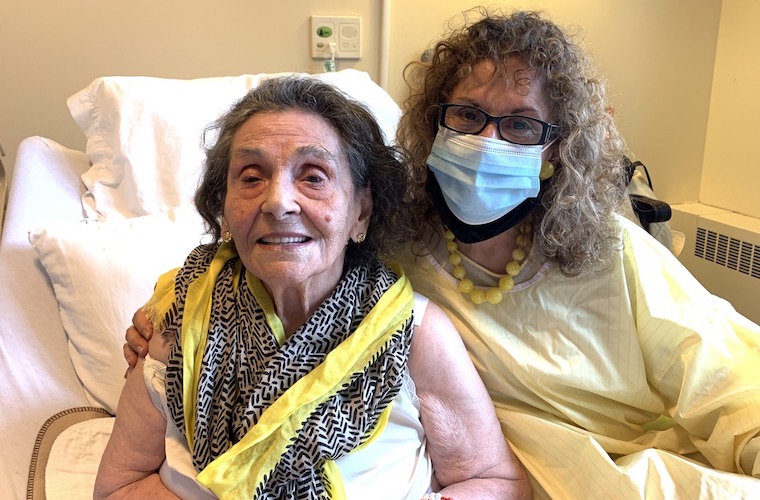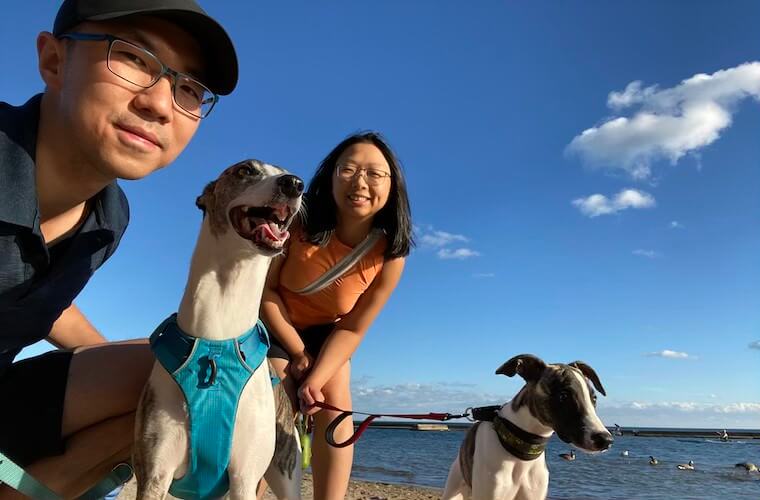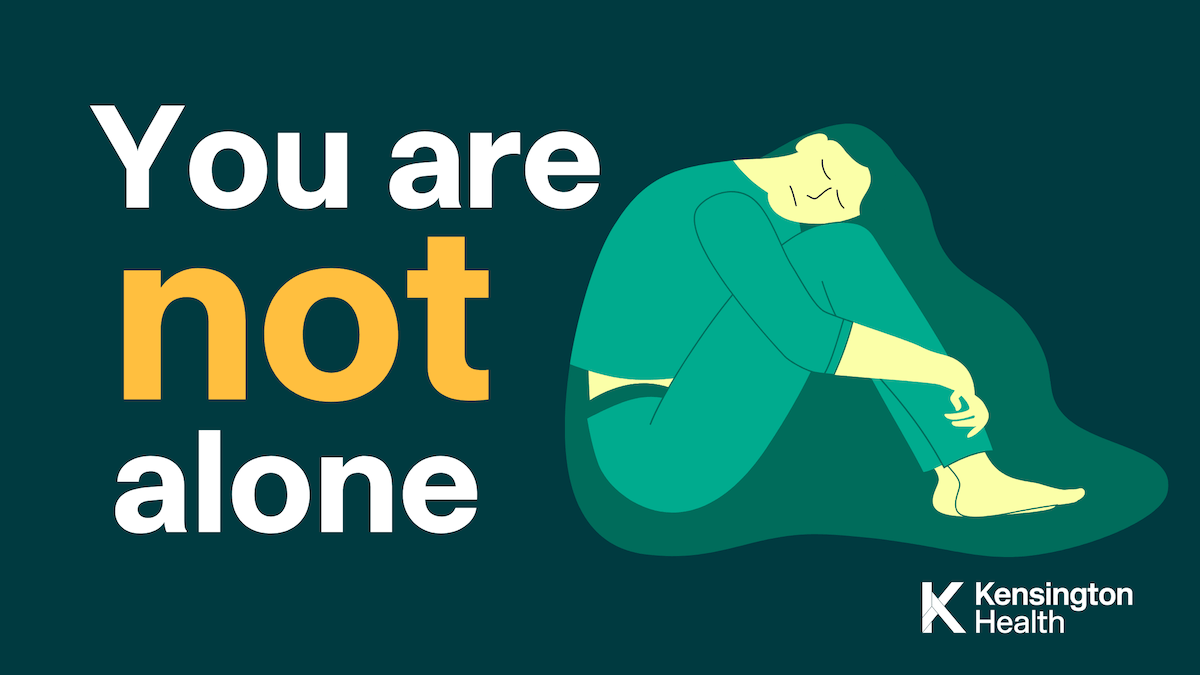Battling mental health issues is hard, but you don't have to do it on your own. As this article shows, this has been a difficult year for our community. If you are in crisis, please call 911, go to your local emergency department, or contact a distress centre on this list. You can also find more resources to support your own mental health here.
Health care in Canada has experienced many challenges throughout the past year with the COVID-19 pandemic. At Kensington Health, these challenges continue as we implement new protocols, policies, and changes to help combat the spread within our organization and community.
This year has been difficult physically, but also emotionally. As we wear PPE to protect our bodies, we also need to protect our minds and support our mental health.
Throughout this pandemic, many have been experiencing feelings of fear, grief, trauma and exhaustion. As we journey down this new path with the help of vaccines families, residents, staff, caregivers, and volunteers need time to unpack and express all the emotions that they have been experiencing throughout this crisis.
It is a tough time for everyone in the community, and dedicating time and effort to improving mental health is not easy. Many people are afraid to speak up due to stigma. We want to change that. Let’s create space to talk about the burdens of this year and say to our community that, “You are not alone.”
The first step is to start a conversation and share experiences about our own struggles, which can help motivate others to share theirs. Many people from the Kensington community have opened up to tell what this pandemic has been like form them. Here are their stories:
Mary
Essential Caregiver
Mary is as high-energy, vibrant, and active as it gets, which helps with how busy her life is on a normal day. Her mother moved into The Gardens during the beginning of the pandemic. Mary is also an important caregiver in her household, as she cares for her husband who has Parkinson’s disease and her mother-in-law who is 96 years-old and lives with her.
Mary is retired, but caregiving is her full-time job: “My friends always ask me: ‘how do you do it?’ The truth is I’m not always upbeat and happy. I have moments of sadness and worry. I sometimes feel that someone should be caring for me.”
While Mary likes to show an optimistic and positive side, she often finds herself consumed by the feelings of exhaustion, frustration and loss of control: “I was getting angry and feeling sorry for myself. So many things are happening in life, and you want to take control to make it better for everybody, but this pandemic has made it hard to do that. As family members, we were frustrated because of the uncertainty. In the beginning, we felt badly that we couldn’t support our loved one and staff at The Gardens. The staff were doing their best, and we certainly felt bad that we were often interfering with their work by constantly calling in and asking about our mom. It was tough feeling to deal with.”
Mary has tips that she uses to cope with the stress: “Maintaining a sense of humour, living one day at a time, and seeing what is positive in each day makes it manageable. I started to realize that as you get older and more stressed, you need to take care of the caregiver. I do a couple of things like walking every day, keeping my thoughts positive, and before bed, I take a couple minutes to focus on my mindfulness and relax. Even though I enjoy being social, taking that time for yourself to be alone is also important.”
Mary adds: “I have lists and lists of things to do, but it’s important that we take time for ourselves. We are human beings not human ‘doings.’ We spend so much time ‘doing’ that we forget to ‘be.’”
Jessica
Life Enhancement Assistant
Jessica has a strong passion for helping people. She brings leisure and recreation therapy to the residents that live on the first floor of The Gardens’ south building.
Before the pandemic, Jessica would bring residents together from all floors for group activities like bingo night, choir, or birthday parties. These days, everything is much more individualized, or with a few residents that must be physically distanced throughout their activities.
The uncertainty of the pandemic has taken a toll on Jessica. She feels the fear, exhaustion and stress that many have felt throughout the year: “Trying to navigate through the emotions that the pandemic has brought has been a challenge. I do feel exhausted, especially with visitation restrictions and a lot of families unable to visit. I have to elevate my role and step in and become that family member for residents even more now than ever. I feel residents miss out on the one-to-one interaction with family, so I try to be that family member for all my 25 residents.”
Isolation has been a challenge for Jessica outside of work: “I’m a social person. I love going out for dinner and movies, volunteering at different organizations, and I’ve also played hockey for 25 years. Being social was something that fueled me and brought happiness. I miss everything about it, even the hugs.”
Jessica adds: “I’m at the age now where a lot of the people close to me are having big moments in their lives. In the past year, five or six babies were born in my friend’s circle, and I’ve only gotten to see pictures or videos of them. It feels like I’m missing out on a big part of their lives.”
The sun staying out longer has really helped Jessica. She also has a couple of tips that she follows to destress: “It’s always good to talk to someone, whether your family or friends. I’ve made good friends at Kensington who have become a support system for me. Meditating, going for hikes and reconnecting has helped. Also, it’s important to remember not to beat yourself up for the things out of your control.”

Nadine Persaud
Senior Director, Client services
For many staff at Kensington Health, there was not much time to process the thoughts or emotions felt at the beginning of the pandemic, there was only one goal: fight this virus and protect the community. Nadine is no stranger when it comes to palliative and end-of-life care. She explains that through this pandemic, the topic of death and dying has been at the forefront of all our minds and (despite her experience of working in this field), the past year has been quite different.
Nadine found that the first wave left Kensington staff with barely any space to process what was going on: “When the pandemic hit last year, we didn’t have time to think. We just had to get the ground running, not knowing what we were truly facing,” says Nadine, “and I think a year later, a lot of the same feelings exist, like uncertainty and grief. There’s a lot of COVID fatigue on multiple levels, and professionally, we are all trying to keep it together and keep going.”
Working in palliative care for her whole health care career, COVID-19 has shown Nadine a different side to hospice palliative care: “There’s been trauma from what we’ve witnessed and seen. Working in palliative care for 15 years, I have seen death and dying daily, but the dying process that I’ve seen from COVID-19 is totally different. And on a personal level, COVID-19 has impacted us in every part of our lives. It’s like a wave of emotions, almost like a never-ending rollercoaster.”
Despite all the challenges and hardships that were faced, Nadine is hopeful for the near future: “There’s still that uncertainty because we have no idea what’s going to happen but there’s always been hope for me. In the beginning, the hope was that we’d get through and manage this, then we’d get a vaccine. And, now that it’s here, the hope is that everybody can get vaccinated; we will be able to control this; and life will get back to whatever normal it will be.”
Working during the pandemic can be very tiresome, but Nadine has learned many life lessons: “This pandemic has shown us that the things that we took for granted are actually the things that we need the most. Human touch. Connections with those we love. I love those close to me a little harder but we have seen how quickly life can change. The pandemic has taught us to be grateful and take a pause. Life is short”.
With everything going on throughout the pandemic, Nadine provides a helpful reminder: “It’s okay not to be on all the time as we place a lot of pressure on ourselves as health care professionals to do so, and this can add more angst to our own situations. The reality of what we are going through is difficult and it’s okay to not to be okay. Understanding this will help with the COVID fatigue. It’s not realistic to always be on.”
Ann
Patient at Kensington Screening Clinic
When Ann was diagnosed with Crohn’s disease in 2017, she never thought she would fall in love with the clinic that she would go to for infusion therapy: “I honestly tell my friends it’s my day at the spa,” says Ann. “They ask me how I am doing, give me a warm blanket, and even cookies – it's such a wonderful atmosphere.”
For Ann, a sense of community is important, and she appreciated Kensington Screening Clinic because it is in her neighbourhood and is a non-profit clinic with staff who really care about their patients. “The other day I was having a particularly difficult time and I just burst into tears during my appointment without intending to,” says Ann. “The staff were warm and present, and I felt completely safe.”
Like many others who require ongoing treatment, the pandemic was anxiety producing for Ann and there are some days that feel bleak. She is thankful that she has a support system around her to help: “I have had depression and live with chronic pain and Crohn’s, which is a lot to manage on top of the pandemic,” says Ann. “So, I know that I need to be careful and stay on top of my mental health.” Ann feels lucky to be fortunate enough to work with a therapist regularly.
Amidst these difficult times, Ann has found moments of incredible joy. Drawing with chalk on the pavement with her grand-niece, hearing the searingly beautiful bells ring at Hart House over the holidays, and is very hopeful for the future.

Antoinette Julien
Education coordinator
Providing educational activities to support and improve a learners’ development is how Antoinette ensures that the Kensington standards are being maintained throughout the campus. While this work has not been easy with the pandemic causing some difficulties, Antoinette makes sure that the job is done.
But without that in-person interaction, Antoinette points out that e-learning can be a challenging task: “Humans are very social beings, and everyone has a unique style of learning. When you’re reduced to having an online classroom, there’s going to be a disconnect in terms of the relationships you build with others.”
The hardships brought on by the events of last year has left a strong mental toll on Antoinette: “Before we knew what was happening, we were all very optimistic that we could handle this. But now when you’re celebrating an anniversary of a pandemic, it definitely takes a toll on you mentally. It’s almost as if you don’t see any light at the end of this tunnel.”
Despite pivoting her education efforts to mostly online classes, Antoinette finds other ways to connect with people and keep herself relaxed: “I used to connect with women I went to university with in a women’s basketball league. But with COVID putting a hold on that, I started finding other outlets like taking time to have wellness day at home. This has helped me maintain good health both physically and mentally.”
John Yip
President and CEO
John has seen the Kensington’s community adapt and endure many changes, including challenging environments, outbreak protocols, and various screening requirements. He’s proud of the strength and courage he has witnessed throughout this crisis.
John knows this on-going challenge has been difficult for staff: “Seeing colleagues go through self-isolation, quit, or even contract COVID could not be easy on one’s mental health. I know how hard it is because I’ve been feeling the effect of the year myself. I’ve witnessed what we’ve went through during wave one and two, and the decisions that needed to be made can have a large impact.”
Because of the challenges last year, John knows Kensington can get through whatever happens next: “I feel better. I feel the teams have been through a lot, and it really gelled our people together and solidified that work ethic and strength that was formed during waves one and two, and that will carry into the third wave we’re seeing now.”
John destresses from the pandemic by working on a project where he jogs through different neighborhoods in Toronto, gaining a new perspective of each area, and he’s happy to have a strong support system to keep his project going: “I’m very blessed and fortunate to have a wonderful family that supports what I’ve gone through at work and gives me the space as a means to allow me to perform better at work.”
Being the compassionate leader that he is, John advises everyone to find their niche: “Whether it’s with your family, a hobby, an outside interest, or binge-watching Netflix; whatever your ‘thing’ is, you should take it up to clear your mind.”
Dr. Cindy Lam
Ophthalmologist

For Dr. Cindy Lam, an ophthalmologist at The Kensington Vision and Research Centre, the beginning of the pandemic was anxiety producing: “We heard rumblings about the virus in January 2020,” says Lam. She remembers feeling nervous once Italy experienced a surge in cases and knew deep down that this was going to be an issue in Canada.
Lam’s husband is an anesthesiologist in Toronto, and she was initially most worried about his safety when he was called in to support COVID-19 patients in ICUs: “The hardest part at the time was that there was still a lot unknown about the virus.” says Lam. “I was worried about losing my husband and loved ones, and the terrible thought that I would not be able to see them if they had to be admitted to the hospital.”
During the first wave of the pandemic, Dr. Lam was very proud of the effort put in by the staff at Kensington Vision and Research Centre to stay open to care for patients experiencing eye-related emergencies in Toronto. The clinic was a more desirable place to send patients, versus the emergency room. Lam also attributes the clinic staying open with helping her stay focused and creating a sense of normalcy in her life, “In the beginning, the clinic was the only thing that still felt like my old life. I would see my colleagues and we were able to do what we loved – care for patients.” The clinic was able to open more fully on June 1, 2020 and is now operating at 75% of its pre-COVID-19 capacity.
“Our patients are generally really thankful for all of the precautions we put into place, and I honestly feel my anxiety has subsided now we know more about the virus,” says Lam. “My life before the pandemic was work, work, work, so in many ways I was forced to slow down and think about other things that matter.” For Lam, those things include her husband, their two lovely whippet children, discovering new walking trails in Toronto, and even learning how to crochet clothes for her whippets. “I feel that I have a stronger connection to the people I love now more than ever. I am hopeful for the future.”
